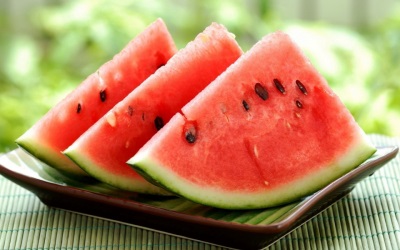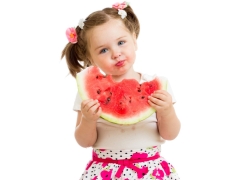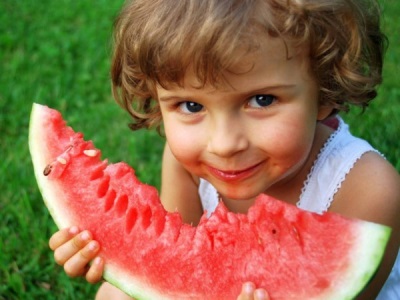At what age can you give a child a watermelon?
The summer season makes us happy with fresh fruits, berries and a variety of vegetables. It is especially pleasant to feast on juicy sweet watermelon in the summer heat, but is it possible to give it to young children? In order to safely introduce the child to this new product, you should learn more about its benefits, the optimal time of introduction into the diet and the nuances of choice for complementary foods.
Benefit
- Watermelon attracts with its pleasant taste and juiciness. It is nutritious and low-calorie, helps quench thirst, contains digestible sugars and pectins.
- Watermelon contains B vitamins, vitamin C, magnesium, iron and many other compounds that are valuable for the body’s work.
- The use of watermelon gives a pronounced diuretic effect.
- Watermelon has a mild laxative effect. Fiber, which is in its composition, helps to clean the intestines.
- Due to the high content of potassium and magnesium, the flesh of the watermelon is useful for the cardiovascular system.
- Eating watermelon, you strengthen the immune system, improve the functioning of the nervous system and eyesight.

Minuses
- Some children have an individual intolerance to watermelon.
- Early fruits often contain harmful chemicals that enter them during cultivation.
- Excessive consumption of watermelon can adversely affect the child's digestive tract.
You can learn more about the benefits and dangers of watermelon from the program “To live healthy”.
From what age can you put in complementary foods?
Pediatricians are advised to offer the crumbs the first slice of watermelon after reaching 11-12 months. Earlier introduction of such a fetus in supplements threatens with digestive disorders and disorders of the kidneys.
In what form to give?
The flesh of watermelon is given fresh, clearing it from seeds. At first, it can be kneaded into a mush or placed in nibler.
You can also cut the flesh into cubes and mix with other fruits already familiar to the child to get a delicious vitamin salad. In addition, from the pulp of watermelon, you can make juice and mix it with other juices.
For a one-year-old child, a daily portion of watermelon should not exceed 50 g. From two years old, a child can be given on the same day up to 100 g of watermelon pulp, and from 3 years old - 150 g of this delicacy.
Tips for choosing
To use watermelon does not damage the health of the child, do not buy the fruit before August. It is best to buy a watermelon in a proven place, refusing from cracked or already cut fruit. At home, the watermelon should be well washed under running water.
Before you treat a child, it doesn’t hurt to check the watermelon first on yourself - let mom or dad try the flesh and, in the absence of a negative reaction, after 1.5 hours you can give birth to the baby. Store sliced watermelon in the refrigerator, but not more than 24 hours.
What if the child ate a bone?
Panic is not worth it. Bones come out with the feces of the child. But a large number of stones can cause obstruction or constipation, so the flesh of the child should be given without pits.
What to do if you are allergic?
Enter the watermelon in the diet of babies should be carefully, starting with a small piece of pulp during breakfast. If by the end of the day the baby has a rash, redness, cough or other manifestations of allergy, the new product is canceled and given to try again in the next season. In case of severe allergic reaction of the child should be shown to the doctor.





























































